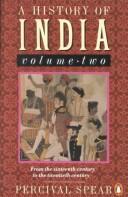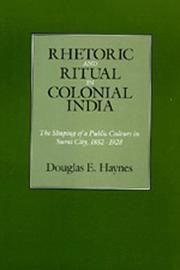| Listing 1 - 10 of 25 | << page >> |
Sort by
|
Book
ISBN: 3110352761 3110387794 3110340895 9783110340891 Year: 2014 Publisher: Berlin, [Germany] : Walter de Gruyter GmbH & Co. KG,
Abstract | Keywords | Export | Availability | Bookmark
 Loading...
Loading...Choose an application
- Reference Manager
- EndNote
- RefWorks (Direct export to RefWorks)
The ancient Tamil poetic corpus of the Caṅam ("The Academy") is a national treasure for Tamilians and a battle-ground for linguists and historians of politics, culture and literature. Going back to oral predecessors probably dating back to the beginning of the first millennium, it has had an extremely rich and variegated history. Collected into anthologies and endowed with literary theories and voluminous commentaries, it became the centre-piece of the Tamil literary canon, associated with the royal court of the Pandya dynasty in Madurai. Its decline began in the late middle ages, and by the late 17th century it had fallen into near oblivion, before being rediscovered at the beginning of the print era. The present study traces the complex historical process of its transmission over some 2000 years, using and documenting a wide range of sources, in particular surviving manuscripts, the early prints, the commentaries of the literary and grammatical traditions and a vast range of later literature that creates a web of inter-textual references and "ations.
Book
Abstract | Keywords | Export | Availability | Bookmark
 Loading...
Loading...Choose an application
- Reference Manager
- EndNote
- RefWorks (Direct export to RefWorks)
A Śaiva Utopia centers on the eleventh chapter of the Śivadharmaśāstra, known as the Chapter on Śiva’s Discipline (Śivāśramādhyāya). A critical edition and annotated English translation of the Sanskrit text of this chapter is preceded by a comprehensive study of the Śivadharma’s revision of the Brahmanical ‘laws on class and discipline’ (varṇāśramadharma), tracing its utopian vision of a society bound by Śiva devotion. An edition and English translation of a Sanskrit commentary on the chapter, preserved on a unique palm leaf manuscript in Malayalam script, is included as well. The book concludes with an appendix, which addresses the revision of the Śivāśramādhyāya in the Bhaviṣyapurāṇa, where the Śivadharma has been turned into a Sauradharma ('religion of the Sun'). A Śaiva Utopia should be of interest to all historians of Indian religions.

ISBN: 0140207694 0140207708 9780140207699 9780140207705 Year: 1973 Publisher: Harmondsworth: Penguin books,
Abstract | Keywords | Export | Availability | Bookmark
 Loading...
Loading...Choose an application
- Reference Manager
- EndNote
- RefWorks (Direct export to RefWorks)
India --- History --- India - History --- Indian history --- Europe --- Aryan culture --- the Mghuls --- Indian culture --- literature --- religion --- art --- British rule --- western civilization --- Mughal rule
Periodical
ISSN: 22134360 13822373 Year: 1960 Publisher: 's-Gravenhage : Utrecht : Dordrecht : Leiden : Leiden : Nijhoff, Stichting Nieuwe West-Indische Gids Foris Publications Royal Institute of Linguistics and Anthropology Brill
Abstract | Keywords | Export | Availability | Bookmark
 Loading...
Loading...Choose an application
- Reference Manager
- EndNote
- RefWorks (Direct export to RefWorks)
Published since 1919, the New West Indian Guide is the oldest scholarly journal on the Caribbean, featuring English-language articles in the fields of anthropology, art, archaeology, economics, geography, geology, history, international relations, linguistics, literature, music, political science and sociology. It also includes the world's most complete review section on Caribbean books — covering some 150 books each year. It regularly publishes contributions by authors around the globe as well as every part of the insular Caribbean.
Koloniale periode. --- Caribbean Area --- Civilization --- Caribbean Free Trade Association countries --- Caribbean Region --- Caribbean Sea Region --- West Indies Region --- humanities --- anthropology --- history --- colonial and postcolonial studies --- West Indian history --- Caribbean studies --- Civilization. --- Barbarism --- Civilisation --- Auxiliary sciences of history --- Culture --- Caribbean Area. --- west indian history --- caribbean studies --- Migration. Refugees --- Ethnology. Cultural anthropology --- History of Latin America
Book
Abstract | Keywords | Export | Availability | Bookmark
 Loading...
Loading...Choose an application
- Reference Manager
- EndNote
- RefWorks (Direct export to RefWorks)
A Śaiva Utopia centers on the eleventh chapter of the Śivadharmaśāstra, known as the Chapter on Śiva’s Discipline (Śivāśramādhyāya). A critical edition and annotated English translation of the Sanskrit text of this chapter is preceded by a comprehensive study of the Śivadharma’s revision of the Brahmanical ‘laws on class and discipline’ (varṇāśramadharma), tracing its utopian vision of a society bound by Śiva devotion. An edition and English translation of a Sanskrit commentary on the chapter, preserved on a unique palm leaf manuscript in Malayalam script, is included as well. The book concludes with an appendix, which addresses the revision of the Śivāśramādhyāya in the Bhaviṣyapurāṇa, where the Śivadharma has been turned into a Sauradharma ('religion of the Sun'). A Śaiva Utopia should be of interest to all historians of Indian religions.
Language --- linguistics --- Literature & literary studies --- Hinduism, History of Religion, Asceticism, South Asian Studies, Sanskrit language and literature, Religious Pluralism, History of Religions, Brahmanism, Religious Studies, Medieval Indian History, Indian History, Hindu Studies, Caste, Hindu law, Saivism, Javanese studies, Bhakti Traditions, Śaivism
Book
Abstract | Keywords | Export | Availability | Bookmark
 Loading...
Loading...Choose an application
- Reference Manager
- EndNote
- RefWorks (Direct export to RefWorks)
A Śaiva Utopia centers on the eleventh chapter of the Śivadharmaśāstra, known as the Chapter on Śiva’s Discipline (Śivāśramādhyāya). A critical edition and annotated English translation of the Sanskrit text of this chapter is preceded by a comprehensive study of the Śivadharma’s revision of the Brahmanical ‘laws on class and discipline’ (varṇāśramadharma), tracing its utopian vision of a society bound by Śiva devotion. An edition and English translation of a Sanskrit commentary on the chapter, preserved on a unique palm leaf manuscript in Malayalam script, is included as well. The book concludes with an appendix, which addresses the revision of the Śivāśramādhyāya in the Bhaviṣyapurāṇa, where the Śivadharma has been turned into a Sauradharma ('religion of the Sun'). A Śaiva Utopia should be of interest to all historians of Indian religions.
Language --- linguistics --- Literature & literary studies --- Hinduism, History of Religion, Asceticism, South Asian Studies, Sanskrit language and literature, Religious Pluralism, History of Religions, Brahmanism, Religious Studies, Medieval Indian History, Indian History, Hindu Studies, Caste, Hindu law, Saivism, Javanese studies, Bhakti Traditions, Śaivism

ISBN: 0520067258 0520909488 0585130698 Year: 1991 Publisher: Berkeley, California : University of California Press,
Abstract | Keywords | Export | Availability | Bookmark
 Loading...
Loading...Choose an application
- Reference Manager
- EndNote
- RefWorks (Direct export to RefWorks)
This book explores the rhetoric and ritual of Indian elites undercolonialism, focusing on the city of Surat in the Bombay Presidency. It particularly examines how local elites appropriated and modified the liberal representative discourse of Britain and thus fashioned a "public' culture that excluded the city's underclasses. Departing from traditional explanations that have seen this process as resulting from English education or radical transformations in society, Haynes emphasizes the importance of the unequal power relationship between the British and those Indians who struggled for political influence and justice within the colonial framework. A major contribution of the book is Haynes' analysis of the emergence and ultimate failure of Ghandian cultural meanings in Indian politics after 1923. The book addresses issues of importance to historians and anthropologists of India, to political scientists seeking to understand the origins of democracy in the "Third World," and general readers interested in comprehending processes of cultural change in colonial contexts.
Elite (Social sciences) --- Social Conditions --- Sociology & Social History --- Social Sciences --- History. --- History --- Surat (India) --- Social conditions. --- Politics and government. --- Elites (Social sciences) --- Surat Municipal Corporation --- SMC --- Surat, India (City) --- Leadership --- Power (Social sciences) --- Social classes --- Social groups --- 19th century indian history. --- 20th century indian history. --- bombay and sind. --- bombay presidency. --- bombay province. --- bombay. --- british colonialism. --- british empire. --- british india. --- center of british power. --- class disparity. --- colonial india. --- colonialism. --- cultural studies. --- democracy. --- empire. --- english education. --- gandhi. --- india. --- indian culture. --- indian elites. --- indian history. --- indian politics. --- indian studies. --- political influence. --- public culture. --- radical transformation. --- social change. --- social justice. --- surat. --- unequal power. --- wealth disparity.
Book
ISBN: 0192184105 9780192184108 Year: 1974 Publisher: London,New York : published for the Institute of Race Relations by Oxford University Press,
Abstract | Keywords | Export | Availability | Bookmark
 Loading...
Loading...Choose an application
- Reference Manager
- EndNote
- RefWorks (Direct export to RefWorks)
Alien labor, East Indian --- Working class --- History --- Colonies --- India --- Emigration and immigration --- History. --- Foreign workers, East Indian --- Alien labor, East Indian - History. --- Working class - Great Britain - Colonies - History. --- India - Emigration and immigration - History.
Book
ISBN: 0141012110 9780141012117 Year: 2006 Publisher: London Penguin Books Ltd.
Abstract | Keywords | Export | Availability | Bookmark
 Loading...
Loading...Choose an application
- Reference Manager
- EndNote
- RefWorks (Direct export to RefWorks)
India --- Inde --- Civilization --- Politique et gouvernement --- Civilisation --- Histoire --- IN / India - Inde --- 203 --- Sociografie. Algemene beschrijving van de gemeenschappen (Sociologie). --- Civilization. --- Sociografie. Algemene beschrijving van de gemeenschappen (Sociologie) --- India - Civilization --- Inde - Politique et gouvernement --- Inde - Civilisation --- Inde - Histoire --- Indian culture --- Indian history --- Indian identity
Book
ISBN: 0520975758 Year: 2020 Publisher: Berkeley, CA : University of California Press,
Abstract | Keywords | Export | Availability | Bookmark
 Loading...
Loading...Choose an application
- Reference Manager
- EndNote
- RefWorks (Direct export to RefWorks)
A free open access ebook is available upon publication. Learn more at www.luminosoa.org. During the height of Muslim power in Mughal South Asia, Hindu and Muslim scholars worked collaboratively to translate a large body of Hindu Sanskrit texts into the Persian language. Translating Wisdom reconstructs the intellectual processes and exchanges that underlay these translations. Using as a case study the 1597 Persian rendition of the Yoga-Vasistha—an influential Sanskrit philosophical tale whose popularity stretched across the subcontinent—Shankar Nair illustrates how these early modern Muslim and Hindu scholars drew upon their respective religious, philosophical, and literary traditions to forge a common vocabulary through which to understand one another. These scholars thus achieved, Nair argues, a nuanced cultural exchange and interreligious and cross-philosophical dialogue significant not only to South Asia’s past but also its present.
Hinduism --- Islam --- HISTORY / Asia / India & South Asia. --- Relations --- Islam. --- Sacred books --- Translating --- History. --- Hinduism. --- Religions --- Brahmanism --- ancient india. --- early modern india. --- hindu sanskrit texts. --- hinduism. --- history. --- indian history. --- intellectual history. --- islam. --- islamic intellectuals. --- jug basisht. --- laghu yoga vasistha. --- metaphysics. --- mughal south asia. --- mughal. --- nonfiction. --- persian. --- religion. --- religious diversity. --- religious history. --- religious studies. --- sanskrit. --- south asia. --- spirituality. --- sufi. --- translation movement. --- translations. --- yoga vasistha.
| Listing 1 - 10 of 25 | << page >> |
Sort by
|

 Search
Search Feedback
Feedback About
About Help
Help News
News